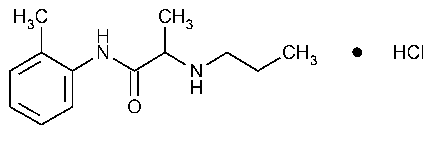Prilocaine Hydrochloride
Propanamide,N-(2-methylphenyl)-2-(propylamino)-,monohydrochloride.
2-(Propylamino)-o-propionotoluidide monohydrochloride [1786-81-8].
»Prilocaine Hydrochloride contains not less than 99.0percent and not more than 101.0percent of C13H20N2O·HCl,calculated on the dried basis.
Packaging and storage—
Preserve in well-closed containers.
Identification—
A:
Infrared Absorption á197Kñ.
B:
Dissolve about 300mg in 5mLof water,add 4mLof 6Nammonium hydroxide,and extract with 50mLof chloroform.Filter the extract,and evaporate the filtrate on a steam bath with the aid of a current of air.Dissolve about 100mg of the prilocaine so obtained in 1mLof alcohol,add 10drops of cobaltous chloride TS,and shake for 2minutes:a bright green color develops,and a precipitate is formed.
C:
Dissolve about 100mg in 3mLof water,render the solution alkaline with 6Nammonium hydroxide,and filter:the filtrate responds to the tests for Chloride á191ñ.
Loss on drying á731ñ—
Dry it at 105 for 4hours:it loses not more than 0.3%of its weight.
for 4hours:it loses not more than 0.3%of its weight.
Residue on ignition á281ñ:
not more than 0.1%.
Heavy metals,Method Iá231ñ:
0.002%.
Assay—
Dissolve about 500mg of Prilocaine Hydrochloride,accurately weighed,in 50mLof glacial acetic acid,add 10mLof mercuric acetate TSand 2drops of crystal violet TS,and titrate with 0.1Nperchloric acid VSto a blue-green endpoint.Perform a blank determination,and make any necessary correction.Each mLof 0.1Nperchloric acid is equivalent to 25.68mg of C13H20N2O·HCl.
Auxiliary Information—
Staff Liaison:Karen A Russo,Ph.D.,Scientist
Expert Committee:(PA1)Pharmaceutical Analysis 1
USP28–NF23Page 1617
Pharmacopeial Forum:Volume No.29(5)Page 1564
Phone Number:1-301-816-8379
